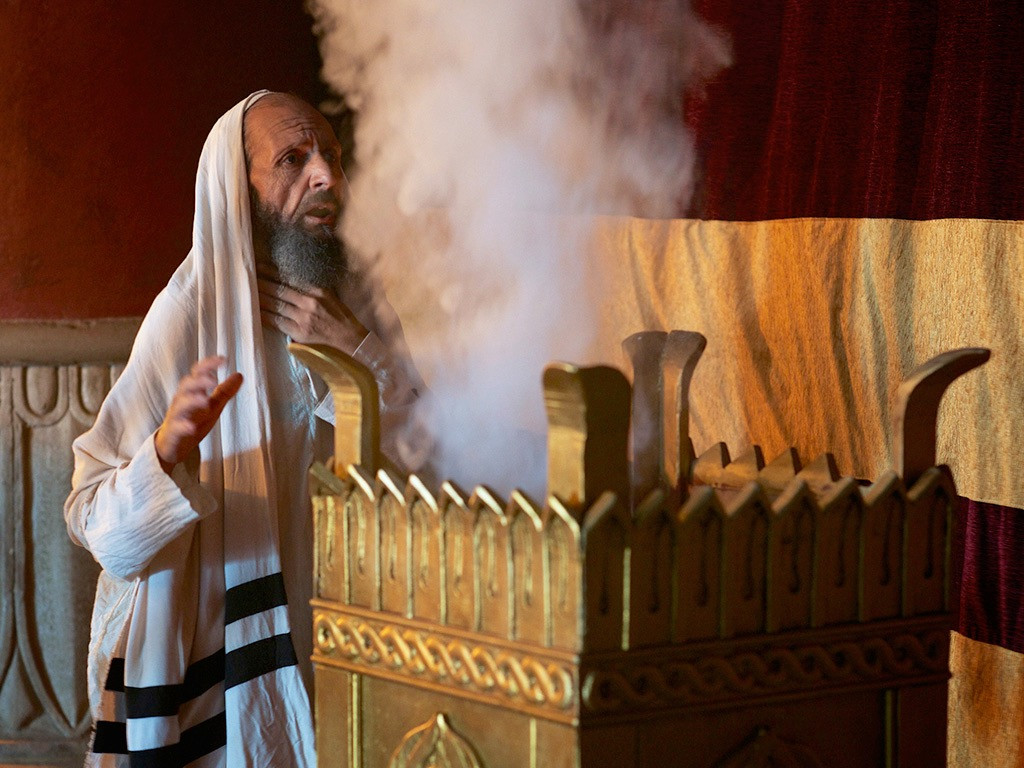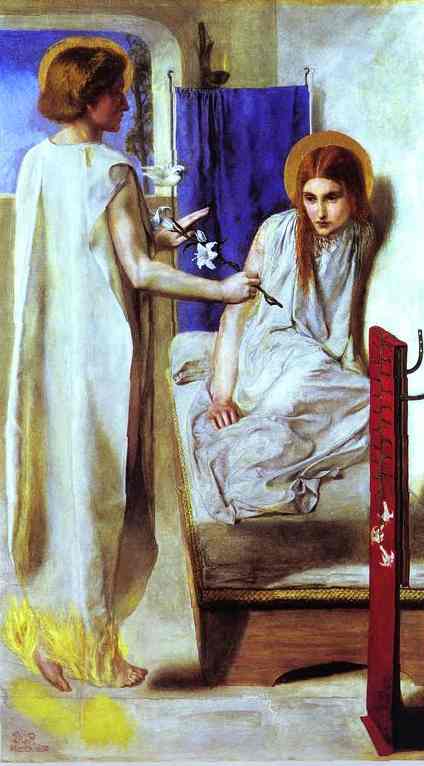5 In the days of King Herod of Judea, there was a priest named Zechariah, who belonged to the priestly order of Abijah. His wife was a descendant of Aaron, and her name was Elizabeth. 6 Both of them were righteous before God, living blamelessly according to all the commandments and regulations of the Lord. 7 But they had no children, because Elizabeth was barren, and both were getting on in years. [Luke 1:5-7, NRSV]
26 In the sixth month the angel Gabriel was sent by God to a town in Galilee called Nazareth, 27 to a virgin engaged to a man whose name was Joseph, of the house of David. The virgin’s name was Mary. 28 And he came to her and said, “Greetings, favoured one! The Lord is with you.” [Luke 1:26-28, NRSV]
[L] Zechariah is promised a son; [R] Dante Gabriel Rossetti, Ecce Ancilla Domini! 1850.
Angel Gabriel appeared separately to Zechariah and to Mary, to make similar announcements about the birth of a son to each of them. But their needs were wildly different. Zechariah and his wife Elizabeth, both in old age, had for years been desperately praying for the gift of a son, for they were childless. The gift of a son to them would be brilliant news for which they would be elated. Mary, on the other hand, was only a young maiden. She had no husband, though engaged to be married. So the last thing she could possibly want at this time was to bear a child, for that would mean death – death to her reputation, and physical death by stoning.
The fact that Zechariah should be struck dumb for disbelief and Mary could believe and say yes is, on first reading, pretty surprising to say the least. Furthermore, their respective backgrounds and the contexts of the angel’s appearance to them only add to the surprise.
Zechariah was a priest. Elizabeth too, belonged to the tribe of Aaron. They were among the elite section of the population. But Luke also included these details: “And they were both righteous before God, walking in all the commandments and ordinances of the Lord blameless” [Luke 1:6]. These are details which, to conscientious Christians no matter what station in life they are in, would pose a challenge for reflection on one’s own righteous living or lack of it.
- As a priest, Zechariah ought reasonably to know well from Scriptures, a group of stories about infertile parents receiving the promise of a son as a gift from God (for whom “nothing is impossible”) – Issac to Abraham and Sarah (Sarah laughed at the time, Gen 18:10-14); Samuel to Eli and Hannah (1 Sam 1).
- Context-wise, the Annunciation of the birth of John to Zechariah was made by the angel in the Holy Place of the Temple. Zechariah was on duty, doing holy things, performing holy liturgy. In a context where he was dealing with divine mystery all the time, it is a surprise to read that he was struck dumb for disbelief.
Mary, on the other hand, was but a simple country girl, a young maiden who came from, of all places, Nazareth (“Can anything good come from Nazareth?). She had nothing to show by way of priestly family background, nor any link to holy duties in the Temple. She being lay and young, it would be easy for us to dismiss her altogether with her mundane stay-at-home existence. But that’s not the way Luke tells the story. He narrates, in shocking simplicity, the opening greeting by angel Gabriel to her: “Hail, O favored one, the Lord is with you!” [1:28]
- Mary being a young lay woman, we do not expect from her a deep knowledge of Scriptures as we would Zechariah. Furthermore, the Annunciation to her by the angel of the birth of Jesus was made in her home, an ordinary, humble abode in sharp contrast to the Holy Place in the grand Temple.
- The angel said the Lord “is” with Mary, not “May the Lord be with you.” This little detail from the Evangelist Luke alerts readers to the simple yet holy existence of Mary. Young though she certainly was, in her daily routine, Mary was already dwelling in the peace and presence of God long before His angel ever showed up. She was always a woman of faith, despite her young age. In her “mundane”, housebound life – it’s in Nazareth, so nothing much to brag about – she nevertheless lived a totally righteous and faith-filled existence pleasing to God
- This surely is food for thought for us living in the busyness of a 21st century modern life. Do we consciously live in the presence of God in our breakneck existence? Scriptures call us to follow Mary and make a commitment to cultivate diligently in our hearts and in our daily lives the daily presence of Christ, through prayers, Bible reading, healthy reading and conversation on spiritual topics and making conscious dwelling in God’s presence. Wherever we may be, one method suggested by a monk living in a monastery deep in the woods outside of Rome, is to consciously place our right hand over our heart every few minutes. That conscious move is an intentional action flowing from a desire to dwell in the presence of God. In that way, there is a definitively better chance that our daily thoughts, words, and actions might be better aligned to God’s desire to see righteous human living.
The question that has been raised with us several times is why even though both Zechariah and Mary questioned the angel, only Zechariah was struck dumb. What was different in their questions? This has to do with the struggle between doubt and faith, a struggle we all have sometimes.
The short answer is supplied by Scripture which attributes it to faith: Zechariah did not believe what the angel said (Luke 1:20); Mary believed (Luke 1:45).
This helps us see a subtle difference in the questions raised by Zechariah and Mary to the angel. Behind Zechariah’s question lied a self-confident knowledge-based belief that their old age meant it was a case of ‘no way’ (Luke 1:18). Mary, who had no husband, only asked how God’s will would be achieved (Luke 1:34). That her fiat followed – “Let it be done to me according to your word” – strengthens the argument that she was just wondering how her pregnancy could come about, but that the angel’s reply had satisfied her wonderment. And when one scrutinizes the angel’s explanation, one quickly realizes that when the angel explained that the mystery would be achieved by the power of the Holy Spirit, she at once submitted to that divine power and gave her “yes” to God.
In Mary, the Church thus finds a solid model of faith, so that Vatican II [1962-65] teaches a crucial point in Marian Theology: True Marian devotion lies in the imitation of her virtues, particularly her faith (Lumen Gentium, 67), not just a blind chase after apparitions and endless begging for cures, even though these are important. Marian devotion, the Church teaches, is first and foremost, about imitating Mary’s virtues, as a child of God, a believer of Jesus Christ, in unity with God’s mission.
Copyright © Dr. Jeffrey & Angie Goh, August 2023. All rights reserved.
To comment, email jeffangiegoh@gmail.com.


